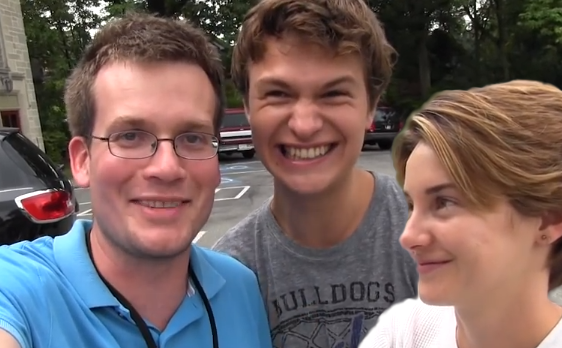Director: Richard Linklater
Country: United States
IMDB: 8.9
Metacritic: 100
RT: 99%
EpicEnthusiast's Rating: A
Watch this movie if you enjoy:
- coming-of-age films
- character-driven stories
- Ethan Hawke
- movies...at all
Avoid this movie if you dislike:
- long films (165 minutes)
- dialogue-driven movies
- minimal plots
Over the course of cinema's history, certain movies have single-handedly changed the industry forever. Disney's Snow White and the Seven Dwarfs (1937) introduced animation to the big screen. Seven Samurai (1954) set the standard for action adventure films. Steven Speilberg's Jaws (1975) changed the way movies were marketed and is widely considered to be the first true "summer blockbuster." Most recently, Avatar (2009) birthed Blu-ray, and brought 3D movies to life again.
Richard Linklater's Boyhood is next in line.
In 2002, when lead actor Ellar Coltrane was just five years old, Linklater and company set out on a daring, yet simplistic mission: Capture Coltrane's character Mason's childhood on camera, in real time. The same lead, the same family, the same crew, and the same screenplay, all until 2013. This kind of commitment is simply unprecedented, and it's one of the many reasons why Boyhood is so fascinating.
| Ellar Clotrane's transformation |
Despite their fragmented nature, Mason's family and their interactions are the strength of the film. At a young age, his father is a loner that drives Mason and his sister Samantha around in a classic GTO without seat belts, takes them bowling without bumpers, and passionately attempts to explain what's going on in the political world. He's opinionated, blunt, and sometimes inappropriate, and couples it with the fact the he works in Alaska and only sees his kids sparingly. Later though, like all the characters in Boyhood, he develops. He remarries and seemingly finds a new outlook on life, and eventually transforms into the father figure Mason longs for. Hawke, who has acted in seven of Linklater's films, plays him brilliantly.
His mother, on the other hand, contributes much more directly to Mason's hardships. She's struggling to pay the bills, has boyfriends coming and going, and is ultimately the one pulling the strings on the family moving all over Texas. Like any single mom, she attempts to shield Mason and Samantha from her tribulations, but that proves difficult. She's constantly pressed with hard questions from the kids, like "Why do we have to move?" or "What about my friends?" and goes back to school so she can get her teaching degree. Arquette's character is a bit of a mess, but in a way, she symbolizes an underlying theme of the movie: life itself is a bit of a mess.
| Mason with his sister Samantha and his father (Ethan Hawke) |
Samantha is fittingly played by Linklater's daughter Lorelei, who according to him, had been insisting on starring in one of his films for a while before Boyhood. She hides the fact that she's an only child and plays the snarky and pestering Sam with impressive authenticity. While the story is centered around Mason, we watch Sam grow up alongside him, and she provides a
unique perspective of the opposite gender.
One thing about the cast is clear: They're extremely close-knit. The film essentially functions as 12 shorts compiled into one, and while physical appearances sometimes noticeably change from year to year, the cast doesn't skip a beat. Linklater's project demanded continuity, and his decision to bring in familiar actors (and a family member) payed off in a huge way. For a fake family meeting up for a few days a year, they're about as close to a real one as you can get.
The time lapse of Boyhood isn't strictly a plot enhancer, though. It's also flat out entertaining. As someone who grew up while filming went on, watching Mason do some of the same things I did as a kid hit very close to home. His experiences and mannerisms were second only to his surroundings. Everything from GameBoy Advances, 20 Questions and Halo 2 on Xbox to RipSticks, 2000s pop songs and Harry Potter book premiers not only define Mason's early years, but define the generation as well. But even if you're not familiar with the specific items featured throughout the film, the basic progression of clothing, cars and other nuances will keep you entertained. They add charm and purity already established by Linklater's script.
With such a highly-praised film, it'd be commonplace to talk about how well it was made or how impressive the cinematography was or how flawless the production value was. Though, truthfully, Linklater's movie isn't flawless. It has some minor editing scuffs (to be expected from such an widespread selection), some forced plot points, and a couple of campy moments.
But Boyhood isn't like any other film, and so it shouldn't be judged like one. The acting is superb, the writing is fantastic, and the soundtrack is fitting, but in this very rare circumstance, all of that is pushed behind the real reason for the film's greatness. It's astonishing because the moments it captures aren't. It's compelling because it's real, and it's groundbreaking because it's simple. Mason's adolescence doesn't include any earth-shattering moments, but there's surely something earth-shattering about his story.
| Mason in the final stages of the Boyhood |
It has only received a limited release, but make sure you find a way to see Boyhood.
-EE
Boyhood is in theaters as of August 25, 2014. Check out the trailer:





















